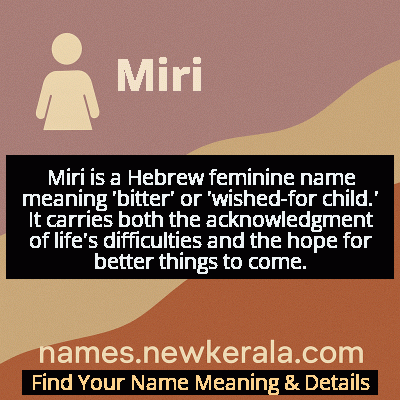Miri Name Meaning & Details
Origin, Popularity, Numerology Analysis & Name Meaning of Miri
Discover the origin, meaning, and cultural significance of the name MIRI. Delve into its historical roots and explore the lasting impact it has had on communities and traditions.
Name
Miri
Gender
Female
Origin
Hebrew
Lucky Number
4
Meaning of the Name - Miri
Miri is a Hebrew feminine name meaning 'bitter' or 'wished-for child.' It carries both the acknowledgment of life's difficulties and the hope for better things to come.
Miri - Complete Numerology Analysis
Your Numerology Number
Based on Pythagorean Numerology System
Ruling Planet
Uranus (Rahu)
Positive Nature
Strong sense of order, loyal, practical, and disciplined.
Negative Traits
Stubborn, overly serious, rigid, and prone to feeling restricted.
Lucky Colours
Blue, gray.
Lucky Days
Saturday.
Lucky Stones
Blue sapphire.
Harmony Numbers
1, 7, 8.
Best Suited Professions
Managers, engineers, accountants, organizers.
What People Like About You
Dependability, discipline, practicality.
Famous People Named Miri
Miri Ben-Ari
Violinist
Grammy Award-winning Israeli-American violinist known as the 'Hip-Hop Violinist'
Miri Regev
Politician
Israeli Minister of Transportation and former Minister of Culture and Sport
Miri Mesika
Singer
Award-winning Israeli singer and actress with multiple platinum albums
Miri Yu
Writer
Zainichi Korean novelist and playwright, winner of the Akutagawa Prize
Name Variations & International Equivalents
Click on blue names to explore their detailed meanings. Gray names with will be available soon.
Cultural & Historical Significance
In modern Israel, Miri emerged as a popular given name during the 20th century, reflecting the trend toward shorter, more informal Hebrew names that maintained connection to traditional roots while embracing contemporary Israeli identity. The name embodies the tension between ancient tradition and modern innovation that characterizes much of Israeli culture. The story of Miriam's Well in Jewish folklore, which provided water throughout the Israelites' desert wanderings, adds another layer of cultural significance, connecting the name to sustenance, survival, and divine providence.
Extended Personality Analysis
Individuals named Miri are often perceived as strong-willed, intuitive, and emotionally deep. The name's connection to 'bitterness' in its etymology doesn't necessarily reflect negative qualities but rather suggests someone who has experienced life's complexities and emerged with wisdom and resilience. Miris tend to be perceptive and empathetic, able to understand others' emotional states with remarkable accuracy. They often possess a quiet strength that allows them to navigate challenges with grace and determination.
Many Miris display creative tendencies, whether in artistic expression, problem-solving, or interpersonal relationships. They are typically loyal friends and family members who value deep, meaningful connections over superficial interactions. Their combination of emotional intelligence and practical wisdom makes them natural counselors and confidantes, though they may sometimes struggle with setting boundaries due to their strong sense of responsibility toward others. The name suggests a person who can find sweetness in life's bitter moments and help others do the same.
Modern Usage & Popularity
Miri remains a popular name in Israel and among Jewish communities worldwide, though its usage has evolved over time. In Israel, it peaked in popularity during the 1950s-1970s and has since become a classic rather than trendy choice. The name has gained some international recognition through Israeli celebrities and cultural exports, appearing occasionally in non-Jewish contexts, particularly in Europe and North America. In recent years, there's been a slight resurgence as parents seek Hebrew names that are both traditional and accessible to English speakers. The name's simplicity and global appeal make it well-suited for multicultural families. While not among the top names in most Western countries, it maintains steady usage and is recognized as both a standalone name and a nickname for Miriam.
Symbolic & Spiritual Meanings
Symbolically, Miri represents the transformation of hardship into strength and wisdom. The 'bitter' meaning connects to the biblical story of Miriam, who witnessed oppression and journey through the desert, yet emerged as a leader and source of spiritual sustenance. This symbolism extends to the idea that difficult experiences can cultivate resilience, insight, and compassion. The name also carries connotations of water and sustenance through Miriam's Well in Jewish tradition, which followed the Israelites through the desert providing life-giving water. Thus, Miri symbolizes both the acknowledgment of life's bitterness and the capacity to provide nourishment and hope to others. It represents the balance between acknowledging reality's difficulties while maintaining faith in renewal and redemption.

